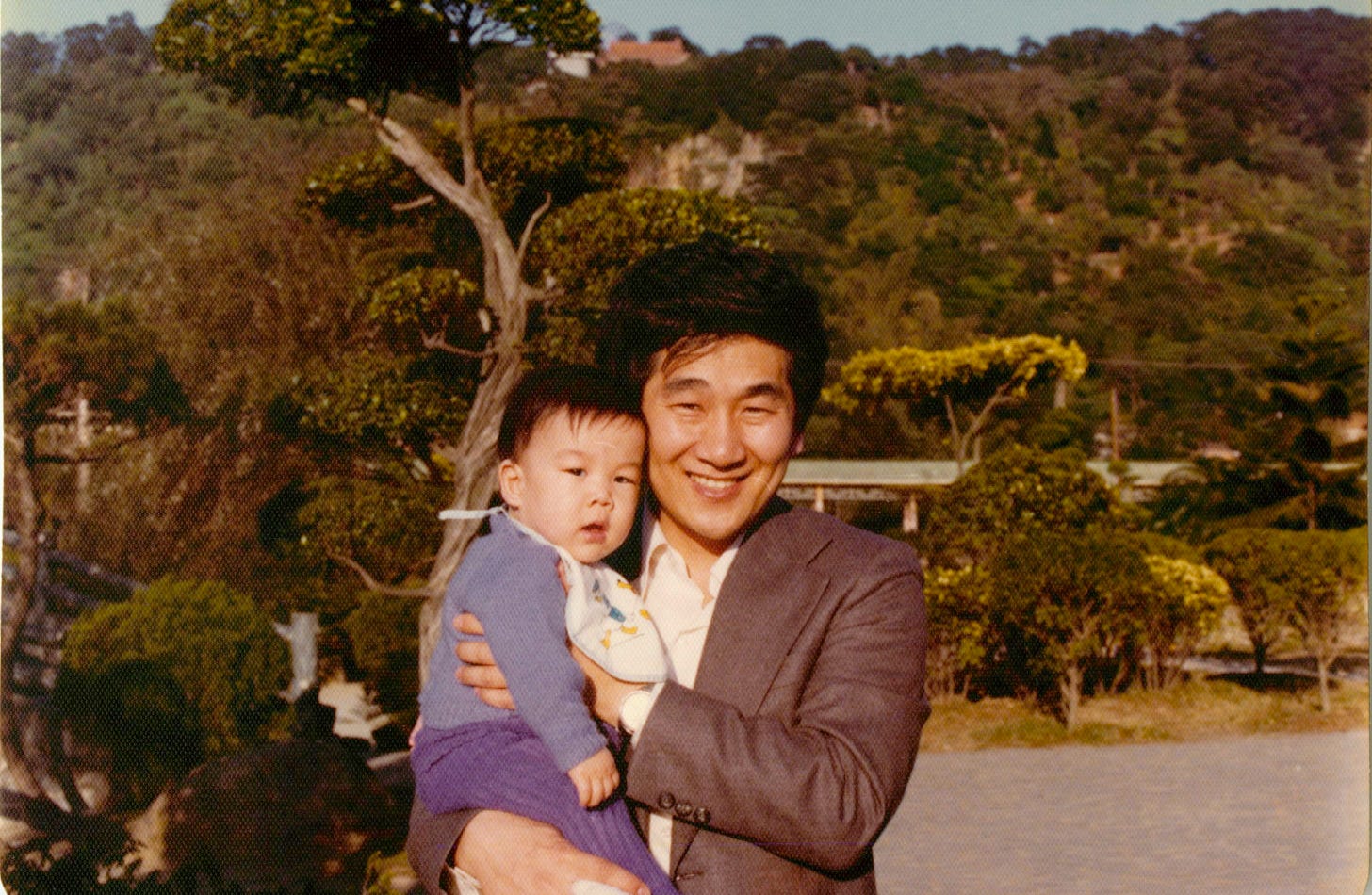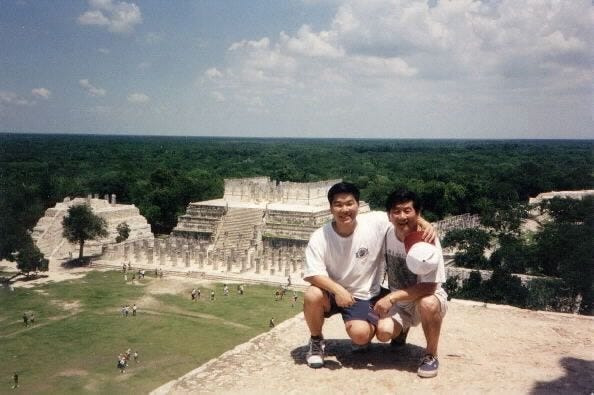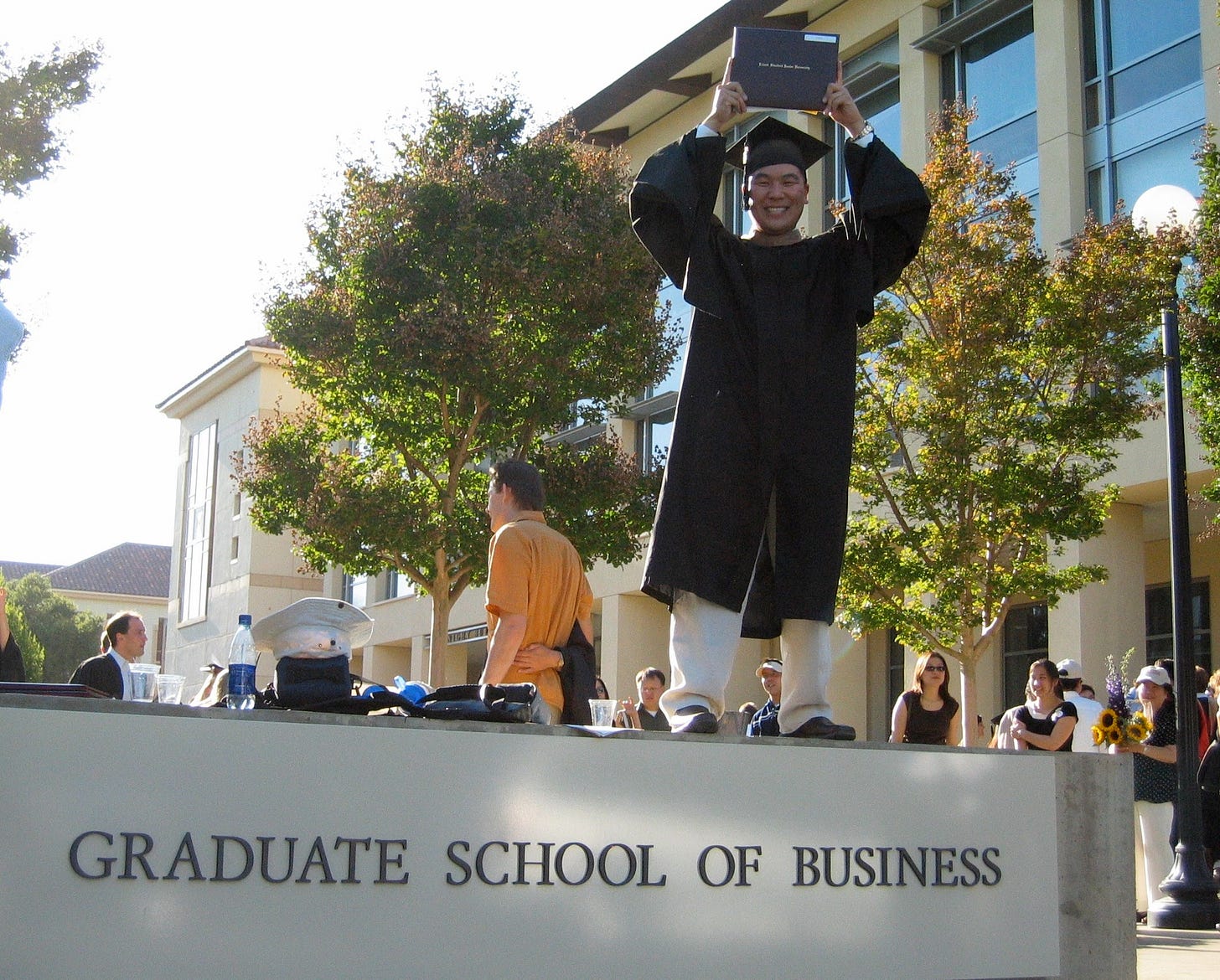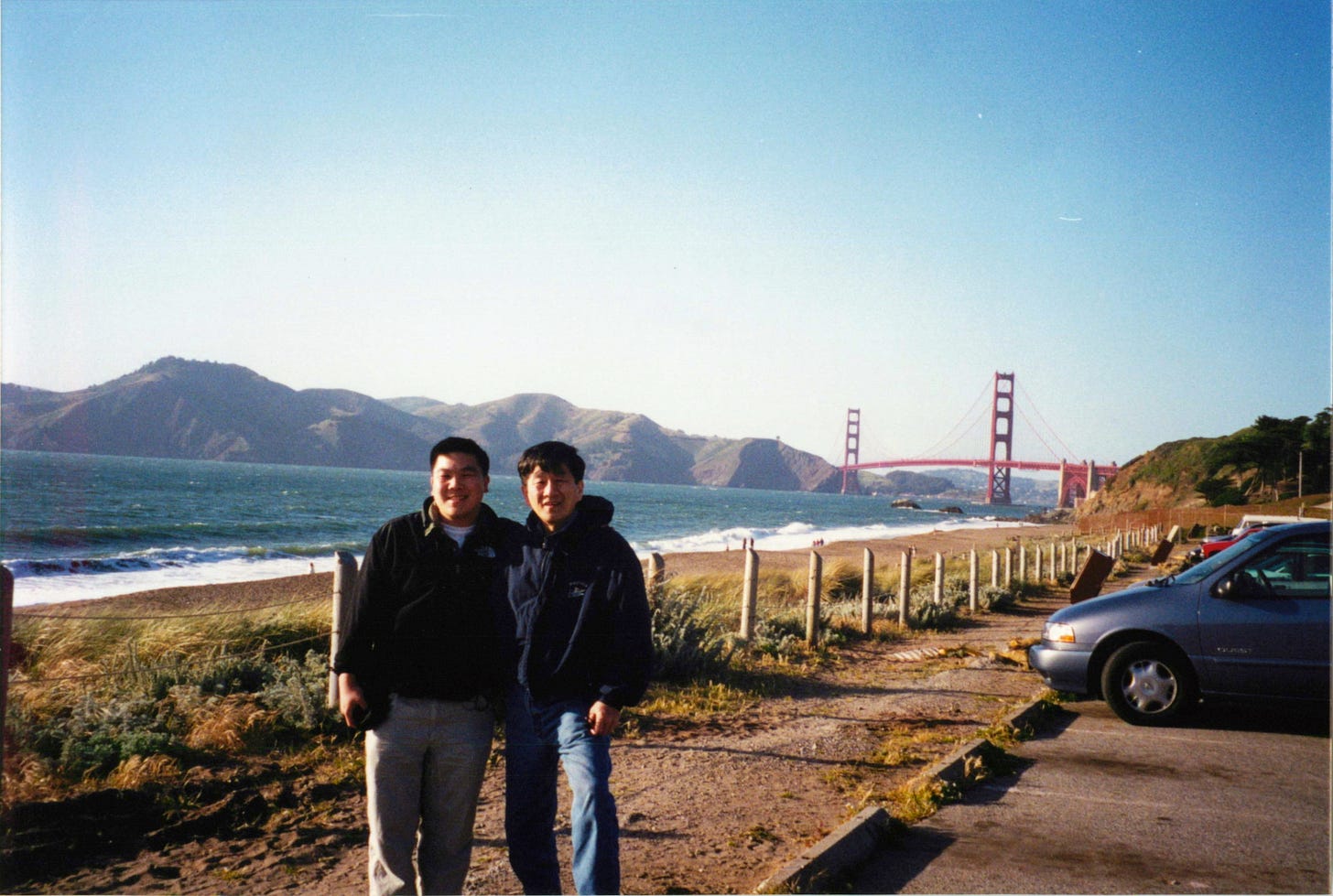A Legacy of Speaking Up
A tribute to my late father in honor of being named an inaugural Centennial Alumni Catalyst by the Stanford Graduate School of Business
When I was in preschool, my mom and dad would take me to the Woodbridge Mall in New Jersey. I vividly remember one day, we were waiting in line to ride the train ride, when a family cut in front of us. I was so confused why they acted like they didn’t see everyone else in line including us, as if we weren’t there. My dad started to yell at them and cause a scene. I remember that feeling of embarrassment when we started drawing attention from passersby. My mom quickly dragged me to the nearby Kay Bee Toy store to shield me from the scene my dad was causing. The family eventually left after being called out, and the people in line behind us thanked my dad for saying something. My dad modeled leadership and agency for me at a very young age: Even though it might not be comfortable, you should always speak up and do the right thing for yourself and for others.
I fondly remember another day with my father when I was eleven years-old. We were sitting in the family room looking at the newest school ranking issue of the U.S. News and World Report. My dad asked me what I wanted to be when I grew up as we flipped through the lists of graduate schools. I said I couldn’t stand the sight of blood or needles, so medical school wasn’t an option. He didn’t trust lawyers so that ruled out law school. My dad was an engineer, so I asked him about engineering. He told me engineers always have a boss, so you always have to do what someone else tells you to do, which he wasn’t a fan of. So we flipped the page to top business schools, and my eyes lit up, because I thought I could be good at business. He smiled and agreed, so we looked through the list together. The number one business school in the world at the time was Stanford. I told him that someday I would go there and get my MBA.
I don’t think most sixth graders know how hard it is to get into Stanford for business school. If I had done more due diligence then, I would have known that at less than 7% acceptance rate, it was the hardest business school in the world to apply to. But it was too late for that, I had already set my goal ridiculously high.
I would go on to get my undergraduate degree in business at the University of Pennsylvania’s Wharton School. I concentrated in finance and strategic management and got my first job as a management consultant with Deloitte Consulting in San Francisco after graduation. I was in Silicon Valley during the dot.com boom, so it was hard not to be allured by all the tech companies that were garnering the attention of the world. I decided to take the leap and join Yahoo working as a product manager on the Yahoo Finance team. I was working on a product that all my college classmates used every day. I was also working for a company co-founded by a fellow Taiwanese American, Jerry Yang. I hadn’t realized how inspiring it would be to see someone who looked like me, starting and running one of the hottest companies in Silicon Valley. I loved my time at Yahoo. To this day, it is still one of the best working experiences of my life.
For Memorial Day Weekend in 2001, I met up with my family for vacation in Las Vegas. After taking in dinner and a Cirque Du Soleil show, my father started not feeling well, so we went back to our hotel room. That night he couldn’t sleep comfortably, so we decided to drive back to Los Angeles early the next day to see family. Things had taken a turn for the worst, so we took him to the hospital. It turns out he had a massive heart attack the night before and that they needed to perform surgery, but it was too late. Within 24 hours of enjoying a rare family vacation bringing together my sister from college in Michigan, my parents from New Jersey and me from San Francisco, my dad was suddenly gone.
I’ll never forget that summer, talking to my mom on the phone from my cubicle in Sunnyvale and hearing her break down into tears every single day. Even though I loved my job at Yahoo and my life in California, I knew I needed to move back East to take care of her. I interviewed for jobs in New York and got an offer from Sony by August. The morning of September 11, 2001, my roommate woke me up and we watched a plane crash into the World Trade Center. My uncle who worked for Cantor Fitzgerald in the North Tower was late to work that day while most of his colleagues (658 of them) perished. The next few weeks were a blur of confusion. I wasn’t sure if Sony would rescind the job offer because New York was in disarray, but I had already given notice and my mom needed me. Thankfully, I still had the job and moved to New York.
That fall, I applied to business school. It was common knowledge that if you were accepted to Stanford, the director of admissions would personally call you to tell you the news. I was constantly checking the Business Week forums to see when calls were going out. The cold December day someone first posted that they got a call, was probably one of the longest days of my life. More and more people posted that they got the call from Derrick Bolton, in his first year as the new director of admissions. I was despondent that I hadn’t heard anything by the end of the work day, so I decided to go see a movie by myself to distract me. I went to see Black Hawk Down, a movie about a disastrous failed rescue mission in Somalia. Needless to say, it did not give me much more hope. By then it was 11pm and I had pretty much accepted that it wasn’t meant to be, when my mom called and said someone from Stanford reached out. I had forgotten that I had applied with my home number in New Jersey, because I didn’t have a New York address yet when I applied! She told me she asked the man if this meant I was going back to California, and the nice man on the phone said he “hoped so” and would call me later. Before midnight, I got the call from Derrick and my life forever was changed.
I wished my dad was around to see me graduate from Stanford with my MBA. I wanted so much for him to be proud of me for achieving the seemingly impossible goal we talked about 17 years prior. My dad never told me he was proud of me growing up, but I just chalked it up to Asian culture. The only time I ever saw him cry was finding a wet napkin on the table after he found out my grandmother had passed away, because he rarely shared much about his feelings with us.
Years after getting my MBA, I was shooting hoops with his best friend from college, who lived next door to us. He told me that my dad would always tell him how proud he was of me, even though he never said it to me. I had felt like I was robbed of that chance when he was taken from me at such a young age, but he had been proud of me all along.
Fast forward to this week, I am humbled and honored to be recognized by the Stanford Graduate School of Business as one of 100 out of nearly 34,000 alumni to be named a Centennial Alumni Catalyst, commemorating the school’s 100-year legacy of principled leadership and innovation.
GSB Centennial Alumni Catalysts are recipients of the school’s first peer-to-peer recognition program. This initiative shines a spotlight on alumni whose peers—friends, classmates, and fellow graduates—nominated them for their extraordinary contributions. Each honoree exemplifies the commitment of the GSB community to change lives, change organizations, and change the world.
The Stanford GSB community has been such an integral part of my journey, so to be acknowledged by my fellow alumni peers this way is incredibly meaningful. I am so grateful to be a part of this family.
“He’s someone you want in your corner when it comes to courageously calling things as they are and fighting for what’s right, even when a cause or goal is unrecognized, unpopular, or difficult.” - Dione Chen, MBA ’90.
“Dave’s work is both visionary and deeply grounded in community impact — qualities that make him a remarkable leader and role model.” - Kim Chan, ’92, MBA ’97.
I know my dad hasn’t been around to see most of the work and advocacy I’ve been doing over the past several years, but I know he’s proud that I followed his example all those years ago by speaking up for myself and for others.







So glad that you realized that your dad was not only always proud but also always trying to communicate that pride with the limited language he had for that kind of intimacy. Stanford was right to honor your contributions, you are a role model for so many of us. Thank you for showing the way.
Thank you for sharing your story Dave. As always, an inspiration to many.